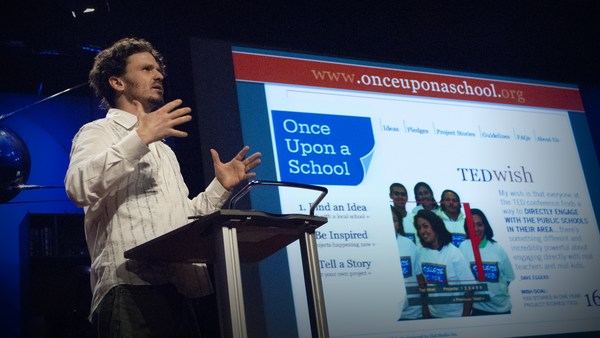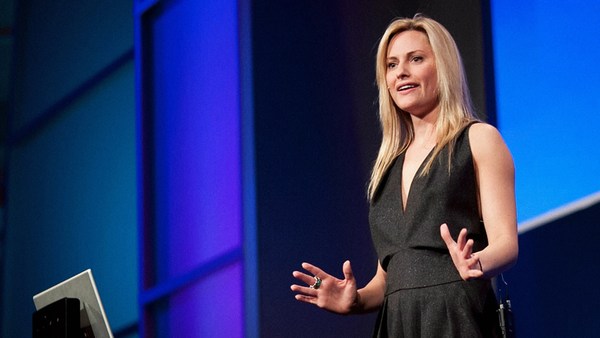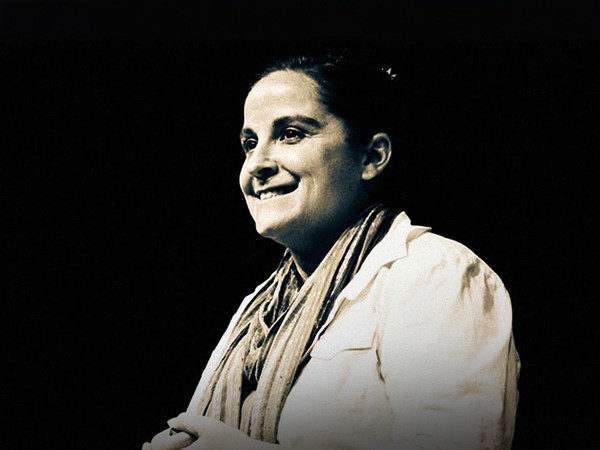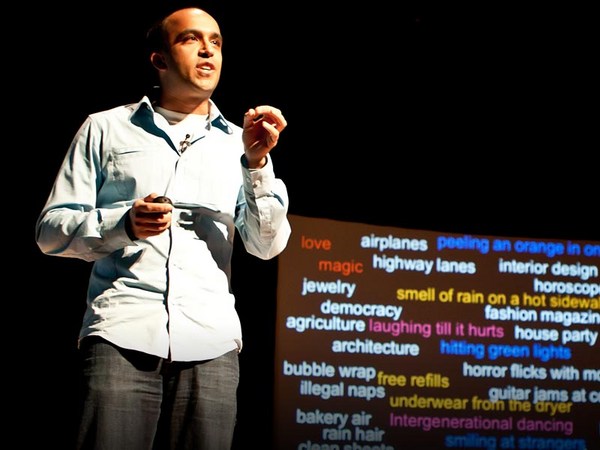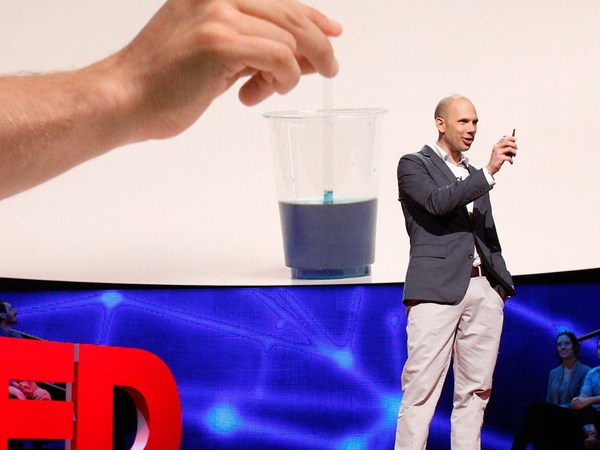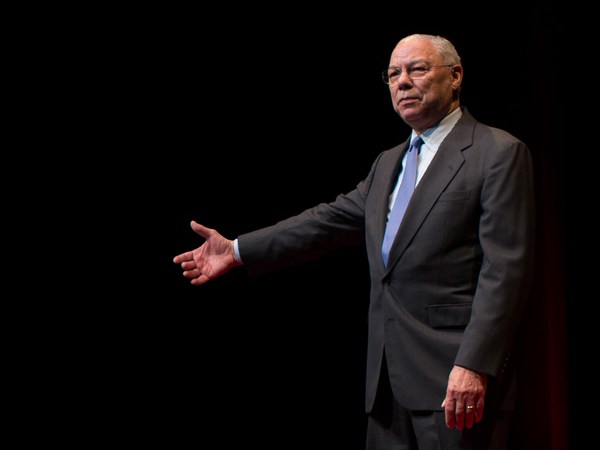You have one job: to be the perfect audience. Engaged, undistracted, to laugh at my jokes - I'm actually pretty funny, so it shouldn't be too hard - and most importantly, to be yourself. Even if you're dressed in a way that doesn't fully represent who you are, when I snap my fingers you will just be yourself. (Finger snap) I'm not actually a hypnotist but I've always wanted to try that. It's so cool. Laughter, ease, eyes, there you are. A few years ago I had to face a big issue. Based on my actions when left to my own natural devices, instead of playing with trucks and cars with the other boys, I would end up wanting to play ... house with the other girls of my kindergarten class. So, at the age of four, I had to make a choice: to be different. To go against the unsaid and unwritten rules of the kindergarten classroom and of most other little boys of the early '80s. One of the unexpected consequences of my choice was that I had to learn the concept of supply and demand real fast. See, I was the only boy who'd let the girls dress him up and play make-believe, and they started to fight over who would get to dress me up as mommy for the next playtime scenario. So one day, I took matters into my own hands. I pulled up a chair. I stood up on the chair. I asked the girls to line themselves up, and I said, "Andrea, you get Monday. Ezra, you get Tuesday. And Sonia, you get Wednesday ... and Thursday." And I celebrated! In fact, looking back, it's the first memory I have of feeling fully empowered for just being myself. That choice to be different would come with another unexpected consequence. Choosing to be different meant that I would be bullied. Severely. I remember later in kindergarten catching other teachers laughing at me and wanting to parade me around to other classes after my girlfriends had dressed me up as a grandmother - heels included. Second grade, out on the playground, an older student ran by and pulled my pants down in front of my friends. Fifth grade: the name-calling started, mostly from the other boys. Seventh grade: out at recess, some of the older kids would throw rocks at me, and I even got hit in the head a couple of times. Ninth grade: the bullying got worse, and one of my girlfriends even started to help one of the bullies who would ride the public bus home with us. She'd sit at the back with him because she thought he was good-looking, and she'd yell up to the front where I would hide and say, "Hey, what's wrong? Are you afraid my new friend is going to find out where you live and come beat you up?" Tenth grade: I was threatened in my own school by another student with a hammer. Through the pain of bullying, I couldn't understand what it was that made me different or what everyone else was picking up on that made me different, and I just remember wishing I could be like everyone else. And that's when it hit me. I was suffering from what I've now come to call "Comparanoia." Comparanoia - the desire to be like or unlike anyone else. Can you relate? I've spent my life struggling with, studying, and overcoming Comparanoia. The even bigger realization I've come to through all of it, is that I've always felt just as disempowered by Comparanoia as I've felt empowered by celebration. Comparanoia presents with an equal and opposite force to celebration. Understanding this has radically changed my life and the lives of everyone I've taught it to, for the better. What does Comparanoia look like for you? Well, I've learned that it shows up in just as many costumes as my kindergarten girlfriends would have me try on. I asked a number of young people, parents, and teachers what Comparanoia looks like for them, and the answers are heartbreaking. Comparanoia shows up everywhere. It shows up online in our posts of living our best life and wondering why our posts don't get as many likes and comments as our friends' posts do. It shows up in the desire to be unique, or in business and entrepreneurship, in "niching down," and in trying to be so unique you end up feeling detached, isolated, and alone. Comparanoia shows up in bullying, where you desperately try to fit in so that you can, you hope, become invisible to your bullies, but all you end up doing is divorcing yourself from who you are, and you end up feeling depressed, miserable, and for me, a teenager falling asleep every night wishing I could end the pain and my own life. Despite being bullied throughout my school years, or maybe because of it, after multiple and simultaneous careers in theater production, music, travel, and just about anything else you could imagine someone who doesn't want to be compared to anyone else would try on, I decided to become a high school music teacher. It makes sense, right? There I was, back in front of the classroom - this time not on a chair; I graduated from that. I learned a whole lot about what it would take to raise and educate young people and how Comparanoia plays a significant part of a young person's life. The classroom would become my research and testing grounds. After a couple of years of not having quite cracked the code on getting clarinet players to sound any better, I started to wonder what would happen if I taught kids to express themselves for who they are, and to celebrate them for that. I theorized that the key wasn't in more rigorous content delivery, but in building them up from a common ground first. So, at the beginning of every school year, I would stand up in front of my new students - not on a chair - and I would say, "Despite what you've grown to know and think, you're not special. And that's the good news!" - See, there's the celebration piece, right? - "When it comes down to it we all want the same things. We want to be loved, to be liked, to feel good about ourselves. The even better news is, you have nothing and no one you need to compare yourselves to or live up to. Your job is to be you. My job is to create a space where you can be you, and to celebrate you for that! Now that you know you're just as special as everybody else, let's get to it!" Celebration became the foundation upon which I built everything else and the singular factor that allowed me to support thousands of young people to grow up into who they've become today. Now, celebration wasn't only reserved for moments of achievement. Sure, I had monthly birthday parties with cake and awkward photo opportunities, but also expressed celebration daily by greeting students at the door and telling them, "It wasn't the same without you," when they returned from missing a day. I had everyday conversations, and we created life experiences for and with them. And confetti launches! Ask any of my former students, they happened all the time and for no particular reason. Well, to my surprise, the classes in which I adopted these simple acts of celebration and practices improved noticeably more than the classes I didn't do this for. Coincidence? Maybe the first time. But I went on to do this year after year, and the results were the same every single time. Could it be that simple? Well, Comparanoia sometimes shows up disguised, just like bullying can be disguised as a casual joke or a half-committed comment that "wasn't meant that way." On June 4th, 2011, at 10:38 and 49 seconds in the morning, my house was struck by lightning and burned to the ground. With my years of practice, celebration had become such a natural response, that as I watched it burn to the ground, I celebrated. The neighbors thought I was losing it. While they were visibly upset, I was celebrating the fact that I was alive, that I was at home when it happened to get my dog, Galileo, out safely, and that all of a sudden, I had a clean slate. All of the things that I thought were valuable were gone, and I realized it wasn't any of those things that made me special or unique. Just like I would do for my students, I was stripped of all the things that I thought defined me. I was also liberated from my Comparanoia. Now I had a choice to make - to start over. And I felt empowered, and I celebrated! I went on to recreate the celebration experiments from my classroom for a marching band and a world-class drum corps. The lasting effects continue to make an impact today. I asked other people what celebration looked like for them growing up. The answers are shocking. For me, as the child of immigrant parents, celebration was reserved for special occasions. Birthdays, some holidays, maybe graduation, if you did something absolutely extraordinary. The choices for what was celebration-worthy were limited, and they were always traditional expressions of celebration. So I started to wonder, what if we redefined celebration to include more options? I express celebration in all sorts of different ways. I dress it up in all sorts of different ways. I keep a daily celebration list where I document and acknowledge even the most mundane, everyday things. When in doubt, I count it out: one, two, three, celebrate! When in bigger doubt, I shake it out. Joseph McClendon III calls this asstitude. It's impossible not to change the way you feel when you move your hips around. Go on, try it right now, move your hips in your chairs. Right. See - laughter, ease, eyes. There you are again. I enter every room as if there's a standing ovation waiting for me because there is! Standing ovations are created in your mind first, and when you're free from Comparanoia, other people feel it, and that is celebration- and standing ovation-worthy. I post truth online, and it's become obvious that I equate my truth with the poop emoji - it's a story for another time. So how does this all work? The Cycle of Comparanoia begins with an incident that triggers a belief you have about yourself or the world. That belief leads to unresourceful thoughts: "I'm not good enough." "I'm unloved." Those thoughts result in unresourceful feelings: sadness, confusion. Those feelings lead to unresourceful behaviors: becoming unproductive or quickly irritated. And those behaviors may ultimately lead to unprecedented actions: from acts of aggression, self-harm, or even violence. The Cycle of Comparanoia shows up the same way for everyone across every age, race, and culture. What I've discovered in my own experience and my observation of thousands of people is that you can change the cycle, alter the outcome, if you choose celebration. When you experience an incident and you choose celebration, the next beliefs, thoughts, feelings, behaviors, and actions will be rooted in celebration. And the even better news is, it's never too late to choose celebration. You can choose it at any point in the cycle, and you'll alter the cycle and change the outcome. And this isn't just what I think. There's been research going on all around the world to understand what underlies happiness, pleasure, and the power of celebration. What I've seen in my own work is that nurture is just as powerful, if not more so, than nature. What does this all look like? Professionals, from executives to entrepreneurs: instead of making it about you, what you want, and where you're going, be unselfish. Focus on others, celebrate others, and you'll find yourself in that. Just like single mom and cancer survivor Danelle Delgado who remembers thinking, "I just wanted to matter, to be worthy of this life I had been given, and to make a significant difference." So, she went out to help a thousand humans uncover their potential, who, in turn, would serve another thousand people to discover their best life and to make a difference. She achieved her goal in three years, and is now thinking even bigger. I challenge you to be unselfish. To focus out and celebrate others. Teachers: Instead of assessing and evaluating your students and identifying their areas of improvement, celebrate what you love, and what you'd love to see more of. I learned this from a brilliantly unconventional teacher educator during my teacher training at the University of Toronto, Dr. Mary Beattie. A concept brought to life beautifully by Principal Adam Dovico, with his Awesome Office Visits program. Students who show great character, growth, and improvements are sent to the office to be celebrated by signing his chalkboard wall and calling home to share in the great news. I challenge you to be unconventional with how you celebrate what you love and what you'd love to see more of the very next time you see your younger ones. Kids, young people, adults: instead of wondering what the other one thinks or wants or needs, listen to each other. Listen with your eyes and with your heart, and be unafraid to ask questions and learn how to communicate with each other in a way that allows you to unleash the best in each other. Just like Robert Bloom, who listened to his son Levi when he said, "Daddy, is there an age limit for opening a LinkedIn account?" And when dad asked why he wanted an account, some months later Levi had launched his own clothing brand "Hazel of Sweden," and he said, "My hoodies have superpowers. I think those adults really need me. They need to start dreaming. I can see that they've stopped dreaming." I challenge you to be unafraid to listen to and communicate with each other with courage and vulnerability. Audiences, viewers: instead of reserving standing ovations and applause for performers and speakers, and for when someone does something extraordinary, what if you gave your friends applause for being who they are? In a moment, as we come to the end of our time together and you break out into roaring applause, I challenge you to make that applause about the extraordinary individuals you're sitting with and about unusual, uncommon, unprecedented you. And you: now I'm speaking to your inner child. Instead of being a bully to yourself with what you say to yourself and what you think about yourself, the most insidious and destructive kind of Comparanoia there is. Recognize that life begins with celebration, and if I have anything to do with it, it's over my dead body that you would exit this world without the same standing ovation and celebration you arrived with! I know what it feels like to believe you'll never measure up. Ten years ago, after I decided to move to the Arctic because I was convinced I'd find myself there, I made the shocking discovery that I was the biggest problem in my own life - maybe you can relate. And I celebrated because I recognized if I was the problem I could also be the solution! I chose to be the solution, to accept the fact that I was just as special as everyone else, and to be myself. So, at 33, I decided to tell the truth, and I finally came out to my friends and family. And as I look back at the bullying I survived at age five, eight, 11, 13, 15, and 16 ... Today, I stand here to document and acknowledge the 10-year anniversary of being disowned by my family, and I celebrate 10 years of being unapologetic being me. I've lived an unboring life. I've traveled to six continents, I've written music, shows, all sorts of things. I've reinvented myself more times than Madonna, Ricky Martin, and Katy Perry combined, and it all boils down to this: the problem isn't a fear of failure, a lack of skills, or even a lack of confidence. The problem is Comparanoia. The antidote is celebration. Both show up in multiple disguises and costumes, and you get to choose which one you put on. I challenge you to compare less, celebrate more, and understand that celebration is so much more powerful when we choose to do it together. Are you ready? One, two, three, celebrate! (Cheers) (Applause) (Giggles) (Applause)
